|
|
|
Sort Order |
|
|
|
Items / Page
|
|
|
|
|
|
|
| Srl | Item |
| 1 |
ID:
144735
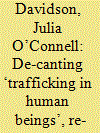

|
|
|
|
|
| Summary/Abstract |
Contemporary liberal states are eager to combat ‘human trafficking’, which state actors describe as ‘the scourge of modern slavery’ and a violation of human rights. The same states are also depriving migrants of their freedom on an unprecedented scale through immigration detention, forcibly moving them across borders through deportation, and sustaining a flourishing industry in the prevention and control of human movement. This is not a paradox. The ambition to eradicate ‘slavery’, as much as the desire to severely restrict freedom of movement, reflects a concern to preserve and extend state powers, in particular its monopoly on violence and on the control of mobility.
|
|
|
|
|
|
|
|
|
|
|
|
|
|
|
|
| 2 |
ID:
093865
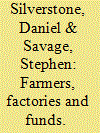

|
|
|
|
|
| Publication |
2010.
|
| Summary/Abstract |
This article explores the growth of organised crime within the Vietnamese community with particular reference to the cultivation of cannabis, money laundering and the smuggling or trafficking of children. The article begins by exploring the history and diversity of the 'Vietnamese community' in the United Kingdom and the role of Vietnamese culture in shaping their criminal enterprises. It then draws on research involving two sets of qualitative data: one set is based on 45 interviews with law enforcement personnel based in Vietnam and the United Kingdom as well as with key stakeholders in the Vietnamese community; the other set is based on structured questionnaires issued to 34 Vietnamese residents in Britain, 24 of whom are here illegally. It examines the relationship between illegal immigration of Vietnamese citizens to Britain and the urban cultivation of cannabis, in what has become known as 'cannabis factories', and the laundering of the profits abroad to Vietnam. After exposing the logistics of Vietnamese illegal immigration into Britain, the article concludes that those involved in cannabis cultivation, money laundering and people smuggling are primarily motivated by profit rather than 'lifestyle' concerns, and operate within what theorists of organised crime refer to as the 'mono-ethnic criminal network'.
|
|
|
|
|
|
|
|
|
|
|
|
|
|
|
|
| 3 |
ID:
104328
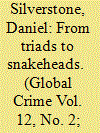

|
|
|
|
|
| Publication |
2011.
|
| Summary/Abstract |
his article revisits the continued existence of organised crime within the Chinese community, with particular reference to snakeheads and the trafficking or smuggling of illegal migrants. This article begins by exploring the history of Chinese organised crime within the United Kingdom and situates its continued existence within an ever more diverse 'Chinese community'. It then draws on research involving three sets of qualitative data: one set is based on 60 interviews with law enforcement personnel based in China and the United Kingdom as well as key stakeholders within the Chinese community; the other set is based on structured questionnaires issued to 25 Chinese residents currently illegally residing in the United Kingdom; the final set is a review of the five free Chinese newspapers analysed over a 2-week period for relevant advertisements relating to migration. It then explores the mechanisms which enable illegal migrants to obtain criminal employment and discusses the motivations of those involved.
|
|
|
|
|
|
|
|
|
|
|
|
|
|
|
|
| 4 |
ID:
121879
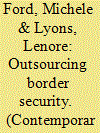

|
|
|
|
|
| Publication |
2013.
|
| Summary/Abstract |
Since the signing of the United Nations Convention against Trans-national Organized Crime, the Straits of Malacca have been identified as a "hot spot" for whole range of maritime security threats, including human trafficking and people smuggling. As a consequence, Indonesia's national and local authorities have been under immense pressure from the international community to develop and implement programmes that address these concerns. Multilateral agencies and other donor organizations have also pumped millions of dollars into counter-trafficking and anti-smuggling programmes in the Riau Islands. Much of the groundwork for both government and international initiatives is done by NGOs, most of which work to identify and assist repatriated migrant workers or victims of trafficking. In one case, however, a Batam-based NGO has gone far beyond this well-trodden path, developing a system to apprehend undocumented labour migrants who use the services of people smugglers to return to Indonesia without passing through immigration. This article examines the case of Gerakan Anti-Trafficking (Anti-Trafficking Movement, GAT) and its implications for our understanding of emerging modes of non-state involvement in border regulation.
|
|
|
|
|
|
|
|
|
|
|
|
|
|
|
|
| 5 |
ID:
176234
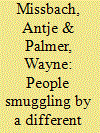

|
|
|
|
|
| Summary/Abstract |
The decline in the smuggling of people from Indonesia to Australia since late 2013 is primarily attributable to unilateral deterrence policies under Australia's Operation Sovereign Borders. When seeking to prevent asylum seekers from coming to Australia to enjoy the right to asylum there, the Australian government has tested a number of deterrent mechanisms that sometimes border on illegality and even state crime. In May 2015, for example, Australian authorities intercepted an Indonesian boat carrying 65 asylum seekers and allegedly paid the six smugglers to return their passengers to Indonesia. In this article, we reconstruct what happened at sea, and put forward a number of arguments that categorise this ‘turnback’ as explicitly-commissioned people smuggling against Indonesia. Our article also points to further implications about looming risks if the policy was to be employed more widely by states in other areas of the world where people cross the sea to seek asylum. Not only would the practice severely undermine international collaborations that have developed to prevent and combat people smuggling, but it would also create additional safety risks for those who are turned back.
|
|
|
|
|
|
|
|
|
|
|
|
|
|
|
|
| 6 |
ID:
149170
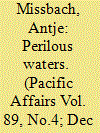

|
|
|
|
|
| Summary/Abstract |
Recent research has found that since 2001 a disproportionate number of Indonesian offenders sentenced to jail for people smuggling, both in Indonesia and Australia, are fishermen from Eastern Indonesia, the poorest part of the country.2 Based on three field trips to the Eastern Indonesian island of Rote, a frequent departure point for asylum seekers to Australia, and semi-structured interviews, this article investigates the socio-economic backgrounds of sentenced offenders from this area to explain their high numbers amongst imprisoned people smugglers. Through the narratives of fishermen who have been involved in the transport of asylum seekers, this article seeks to reconstruct their decision-making and risk-taking strategies in light of their generally precarious lives. Their motivations to become involved in people issue_images_89_4_missbach_rote-island-2smuggling are correlated with two structural problems they face, overfishing and pollution, which have exacerbated their economic situation over the last years. Understanding the local structural constraints of these impoverished fishermen helps provide a clearer understanding of why and how transnational people-smuggling networks succeed in recruiting them. Rather than viewing the decision to become involved in people smuggling as an individual’s poor judgement and its negative outcome as self-inflicted misery, this article stresses the notion of collective hyper-precariousness, which is enhanced by extrinsic factors such as Australian policies that have further limited the meagre choices for making a living legally on Rote
|
|
|
|
|
|
|
|
|
|
|
|
|
|
|
|
|
|
|
|
|